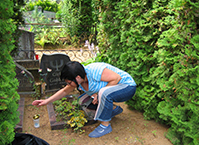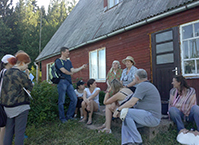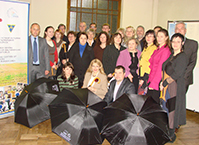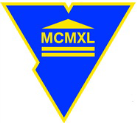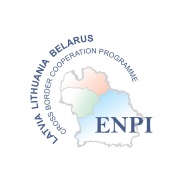E-MUSEUM “VITAMEMORIAE”: COLLECTION AND RESEARCH
Foto
To record people’s life stories, traditions, customs, rituals, rare photographs, old documents, ethnographic differences in funeral rites, etc. the researchers of Daugavpils University and Yanka Kupala Grodno State University carried out field studies in LV and BY territories: in the villages of Krāslava, Rēzekne, Daugavpils regions (Asūne, Foļvarka, Kruki, Skrudaliena, Indra, etc.) and in Belarus (Braslav and Vitebsk districts). The field studies were implemented in the framework of the project “Popularization of the Centres of Oral History in the LV – BY Cross-Border Area”, ID Nr. LLB–2–143, of the Cross Border Cooperation Programme Latvia–Lithuania–Belarus implemented within the framework of the European Neighbourhood and Partnership Instrument 2007–2013.
During the research and the expeditions, the project implementers collected, segmented, transcribed, and digitized the audio-visual materials (audio and video records, photo evidence). To make the collection of the E-Museum more complete, the field researchers and cemetery researchers of Daugavpils University and Grodno University will segment and systematize the audio-visual materials collected during oral history, cemetery research, folklore and dialectology expeditions of the previous years that until now have not been used, aiming at including the best and most valuable segments of the collection into the E-Museum.
The story tellers whose life stories make the input of the E-Museum are people of various generations, mostly elderly people. The childhood of aged people, who at present are about 80 years old, proceeded in the 1930s, therefore the segmented audio-visual units included in the E-Museum chronologically begin from 1929 and can describe only the respondents’ childhood memories. The memory of the older generation is particularly important for the anthropological and historical research – it shifts the time borders, allows for moving to the events of the past through the viewpoints of those who have experienced those times. The facts can be found in chronicles, but what the witnesses of that time can reveal give the memories colour, scent, involve one into mutual emotional experience. The witnesses of the epoch tell about the events form the viewpoint of their own experience.
To motivate the respondents to share their life stories, the project field researchers used Paul Thomson’s oral history research method – enlarged vision of social history where diverse groups of the society are brought together and share common historical experience.
The research basis is the methodology of a semi-structured interview that envisages focused (guided) reconstruction of the past events and an interviewer only helps the respondents to reconstruct the past.
The oral history collection of the E-Museum is envisaged to be used not only by specialists but also by a greatest possible range of non-specialists, therefore, departing from the academic tradition envisaging a complete script and transcript (written transcription of an audio or video record) of life stories, the project experts agreed to segment 360 most vivid, colourful, expressive, unusual, typological or extraordinary audio-visual units (photo, video and audio testimonies) – thematically complete excerpts, and to systematize them according to the thematic plan that would encompass both the historical processes of the 20th century (from the 1920s-30s) and the most essential events of an individual’s life.
ACCESSIBILITY OF THE COLLECTION
The interviews included into the collection are arranged according to the principle of historicism, anthropologism and personalia, indicating the author’s name and the interviewer’s name and surname.
-
Lev Shlyakhter: Beginning of the war
How did you get to know that the war started on the 22nd? Did you hear about it on radio?
You know what. That happened that on the 22nd of June, there lived people in the neighborhood, their …
Researcher: Natalja Ivashchanka, Sviatlana Silava, Yanka Kupala State University of Grodno
Categories: Beginning of the war, Lev Shlyakhter
-
Lev Shlyakhter: Nationality
Do you consider yourself a Jew? I mean the religion. Or the nationality. Do you feel like a Jew or not?
You know, I can tell you frankly. I was an unbeliever, and my father was an unbeliever, I know …
Researcher: Natalja Ivashchanka, Sviatlana Silava, Yanka Kupala State University of Grodno
Categories: Holidays and traditions, Lev Shlyakhter
-
Lev Shlyakhter: Clothes
Where did you get dressed, where did you take clothes?
Clothes? Somebody bought at the market, wherever. For example, I had clothes; I went to school when my mother was alive.
You are probably …
Researcher: Natalja Ivashchanka, Sviatlana Silava, Yanka Kupala State University of Grodno
Categories: School, Lev Shlyakhter
-
Lev Shlyakhter: Relay flights
There appeared so called relay flights. Do you know what is passenger capacity of plane «ИЛ-14»?
No.
22 passengers and 3 persons of crew.
Is it like a huge crop-duster or not?
No, a …
Researcher: Natalja Ivashchanka, Sviatlana Silava, Yanka Kupala State University of Grodno
Categories: Residence and weekdays, Lev Shlyakhter
-
Lev Shlyakhter: Food, candies
Stoves were thrown away, stove... We had these iron heaters, tin heaters that had chimneys running out through the window.
Potbelly stoves, yes?
Such potbelly stoves. If we had potatoes, there was …
Researcher: Natalja Ivashchanka, Svetlana Silava, Yanka Kupala State University of Grodno
Categories: Family, Lev Shlyakhter
-
Alla Mikhajlova: Soviet time shops
Please tell me what could you buy at the shop in Berezovka?
When we came here I stared to work at the general merchandise shop, I had to accept everything, there were clothes, shoes, everything & …
Researcher: Kseniya Adasik, Yanka Kupala State University of Grodno
Categories: Residence and weekdays, Alla Mikhajlova
-
Alla Mikhajlova: Parents
We managed to move from Vladzivastok during the War. My sister was born in 1937 and I was born in 1939. And about 1942–1943, probably in 1942 we moved from Vladzivastok. We told our father that …
Researcher: Kseniya Adasik,Yanka Kupala State University of Grodno
Categories: Parents, Alla Mikhajlova
-
Alla Mikhajlova: Movement to Berezovka
We came here (to Berezovka) to visit our relatives. And the parents started to persuade, so they persuaded us, told us. So me and Andrei (my son) stayed here, he (husband) went back to the Urals. So …
Researcher: Kseniya Adasik,Yanka Kupala State University of Grodno
Categories: Residence and weekdays, Alla Mikhajlova
-
Alla Gajdis: About mass execution during the War
They took soldiers to be shot. After they were taken over there, a hole was dug, there were such a hill, forest and such a ditch, a drain around it, when the people were walking the ground was …
Researcher: Aleksej Zagidulin,Yanka Kupala State University of Grodno
Categories: Wartime, Alla Gajdis
-
Alla Gajdis: Confessional relations before the war
Gipsy cemetery.
It is on the hill.
The legend is the following: there was a cemetery here, a village cemetery. But before there lived lots of the Jews, oh no, the Gipsy. They were going in Gipsy- …
Researcher: Aleksej Zagidulin,Yanka Kupala State University of Grodno
Categories: Confessional and international relations, Alla Gajdis


